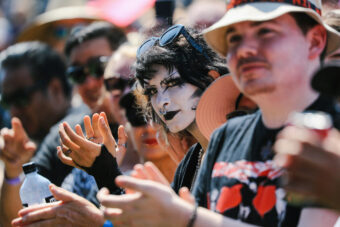How seriously are we supposed to take the Rock and Roll Hall of Fame inductions?
Certainly, plenty of the musicians who make the cut are inarguably great. But a conception of classic rock’n’roll that makes room for solid journeymen like Percy Sledge and the Dave Clark Five, but doesn’t include more talented, slightly more obscure singers like O.V. Wright or innovative talents like Todd Rundgren, isn’t one I give much credence to.
Still, the selectors did a decent job this year. Below is my take on the nine new inductees, along with a “Hall of Fame Worthiness” rating of 1 (worst) to 10 (best) for each.
Metallica
The first true metal band to be inducted is the most commercially lucrative headbanging outfit of all time and the most artistically successful. Straight thrash, proggy epics, moody ballads, and an amazingly candid documentary — these guys did it all. And they’re still doing it: Last year’s Death Magnetic kicked ass.
Hall Worthiness rating: 10
Jeff Beck
Already in the Hall as a guitarist for the Yardbirds, Beck now gets enshrined as a solo artist. There was a time in my life when I was a serious guitar nerd, and even then I had a hard time getting into this guy. 1968’s Truth (with Rod Stewart on vocals) still holds up as some swinging, meaty blues-rock, and albums like Blow by Blow and Guitar Shop are full of thoughtful, inventive playing, but they’re more admirable than awe-inspiring. I read a quote once where someone said that ’70s kids would get into schoolyard fights about whether Jimmy Page or Ace Frehley was the better guitar player, but that no one got into fights over Jeff Beck. I think that’s telling.
Hall Worthiness rating: 5
Run-DMC
1980s albums like Raising Hell and King of Rock are classics of hip-hip and helped establish rap as serious commercial entity. “Walk This Way” was a rap-rock landmark (and helped revive Aerosmith’s career). And don’t forget that the band also brought a new streetwise fashion sense to the mainstream. MC Run, Jam Master Jay, and D.M.C. slid into irrelevance by the ’90s, but by then their legacy had been firmly established.
Hall Worthiness rating: 9
Bobby Womack
An underappreciated hero. The breadth of Womack’s career is amazing.From his ’60s beginnings as a member of R&B act the Valentinos (for whom he wrote “All Over Now,” later covered by the Rolling Stones), to his funky ’70s songs (check out his soundtrack to Across 110th Street), to helping invent sultry Quiet Storm on 1981’s The Poet, Womack’s been something of a soul music Zelig. He’s also an excellent, earthy guitarist.
Hall Worthiness rating: 8
Little Anthony and the Imperials
I’m not going to pretend to be any sort of expert on these guys’ music, but I know that lead singer Jerome Gourdine has a gorgeous falsetto.
Hall Worthiness rating: 6
Wanda Jackson
This rockabilly queen was inducted in the “Early Influence” category, which is reserved for performers who pre-dated rock’n’roll. Jackson’s late ’50s barnburners like “Mean, Mean Man” and “Fujiyama Mama” feature a ferocity rare among women artists of the time. Jackson also pioneered a flashy style of dress (think fringe and sequins) that caught the eye of later performers like Dolly Parton. Though Jackson was never as transcendent as a fellow tough sister like Loretta Lynn, every club needs more room for sassy brassy country gals. One quibble: given that Jackson was active and popular throughout the rock era (other Early Influence inductees include Hank Williams and Robert Johnson, both of whom died before rock took off), I’m not quite sure why she was shoehorned into this category.
Hall Worthiness rating: 7
Spooner Oldham
Inducted into the Sidemen category, keyboardist Oldham lent his graceful gospel chords to countless soul classics, including Percy Sledge’s “When a Man Loves a Woman.” The Muscle Shoals studio regular also co-wrote immortal hits like the Box Tops’ “Cry Like a Baby” and oft-covered “The Dark End of the Street.”
Hall Worthiness rating: 8
Bill Black and D.J. Fontana
Black, on bass, and Fontana, on drums, formed the rhythm section for early Elvis Presley hits like “Heartbreak Hotel” and “Hound Dog.” They were both capable musicians, but did either of them contribute anything that, say, Carl Perkins’ backup band couldn’t have? It’s also no stretch to say that neither Black nor Fontana was as influential or talented as their bandmate, lead guitarist Scotty Moore. That this duo helped usher in rock history is inarguable, but just how integral they were to that history is questionable.
Hall Worthiness rating: 4




